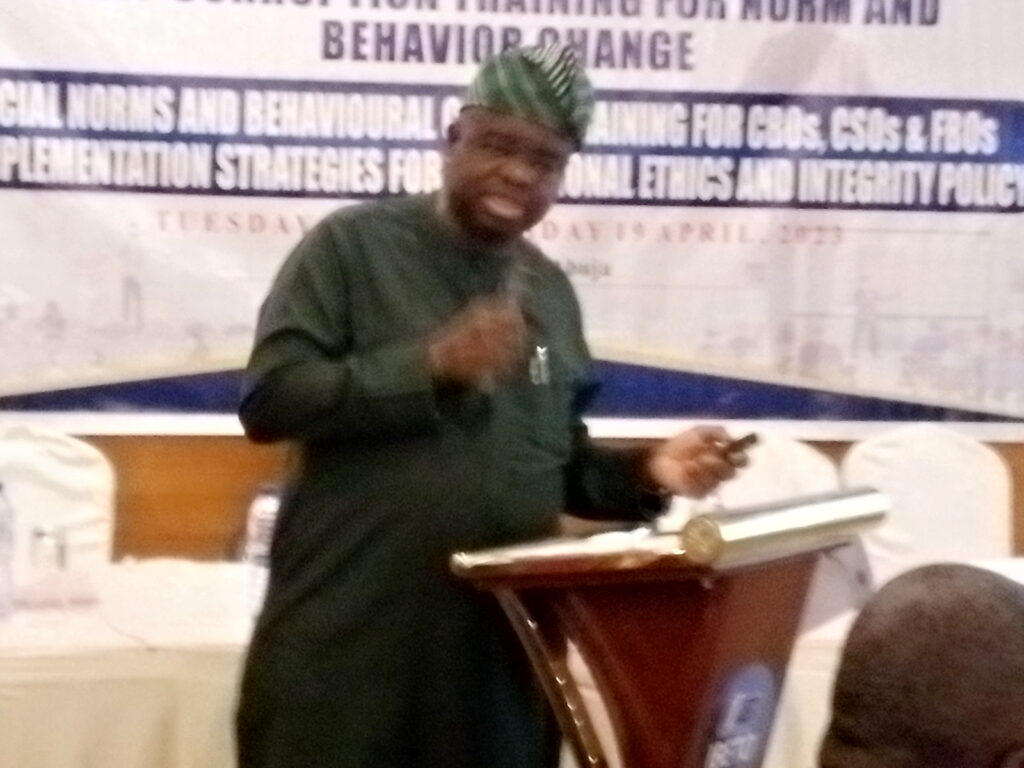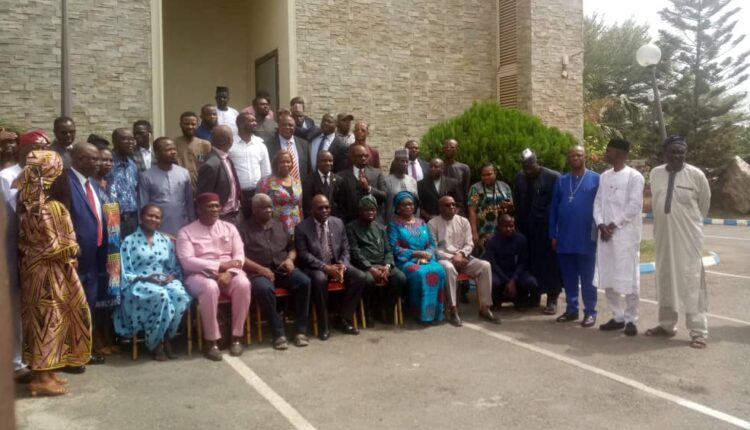Anti-Corruption Academy of Nigeria trains CBOs, FBOs, others on implementation strategies for NEIP
|
Getting your Trinity Audio player ready...
|
A group photograph of participants including ICPC chairman, Professor Bolaji Awasanoye, Provost, ACAN, Professor Olatunde Babawale, after the opening formalities
By Samuel Torlumun, Anthony Maliki, Abuja
The Anti-Corruption Academy of Nigeria, (ACAN), a research and training arm of the Independent Corrupt Practices and Other Related Offences Commission, (ICPC), has began training of Community Based Organizations, (CBOs), Faith Based Organizations, (FBOs), Civil Society Organizations and organized private sector in Abuja, in a two-day programme.
The social norms and behavioural change training is based on strategies for the implementation of National Ethics and Integrity Policy, (NEIP).
The policy which is aimed at addressing the declining national values and ethics, will improve, the fight against corruption in Nigeria. To achieve this, a broad-base private sector stakeholders are required for robust implementation to enhanced behavioural change.
Addressing participants, Provost, ACAN, Professor Tunde Babawale, said the purpose of the 2-day training is to help stakeholders implement National Ethics and Integrity Policy, (NEIP) with a view of stimulating desirable change, by domesticating what might have been learnt.
He added that the “training has a long term goal of helping stakeholders to translate the values prescribed by NEIP into anti-corruption behavior.
“The 2-day training is designed to be beneficial to all trainees regardless of the level of their prior understanding of the NEIP”, he stated.

ACAN Provost, Professor Babawale speaks at the event
Professor Babawale said that ACAN has trained over 19 000 people since inception. He expressed gratitude to the support granted ICPC and ACAN by Macarthur Foundation in terms of funding and other deliverables.
In his opening remark, the Chairman of ICPC, Professor Bolaji Owasanoye, SAN urged all stakeholders to collectively stand firm in support of NEIP. He said, many in the country have failed to live up to the required ethics and values due to certain parochial interests. He stated that the core values NEIP emphasises do not contradict both religious and cultural values.
Corroborating with ACAN Provost, he said the paradigm shift from law and order to norms and values in the commission’s training intelligence for effective solution to social problems, is the new fad.
“Globally, it has been realized that law and order approach alone dose not lead to social transformation in solving problems like corruption. So if we don’t change our behavior, we are only deceiving ourselves in the fight against corruption” he posited.
ICPC chairman, Professor Bolaji Awasanoye delivers a speech at the event
Professor Owasanoye noted that the country is crying for national reorientation, on certain general perception. For instance, he said, a general perception that corruption is public sector based, is a fallacy arguing that corruption can’t be properly executed without collaboration with the private sector.
Speaking from the traditional institution point of view, the Emir of Keffi in Nasarawa State, Alhaji Dr. Shehu Chindo Yamusa III represented by the Wambai of Keffi, Alhaji Ibrahim Usman said the National Ethics and Integrity Policy (NEIP) cannot come at a better time than now, due to challenges facing all sectors be it government or private.
He said what is happening in the society due to lack of respect for one another’s voice and sacrifices due to lack of nationalism, patriotism and development above our individual sentiments.
The Emir said the success of this country can only be achieved through collaboration and placing everything where it belongs to.
Alhaji Yamusa III commended ACAN for involving the traditional institutions because of its peculiarity and closeness to the common man and would go a long way at solving some of the hindrances affecting national unity and development.
He urged ACAN to concentrate on those values that would add to the success of the fight against corruption, indiscipline, maltreatment, sectional differences and disunity, growth and development.


